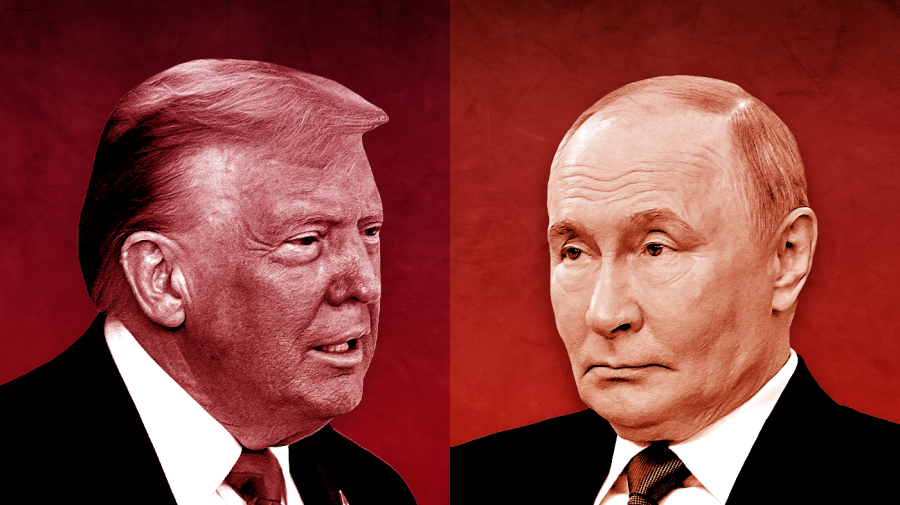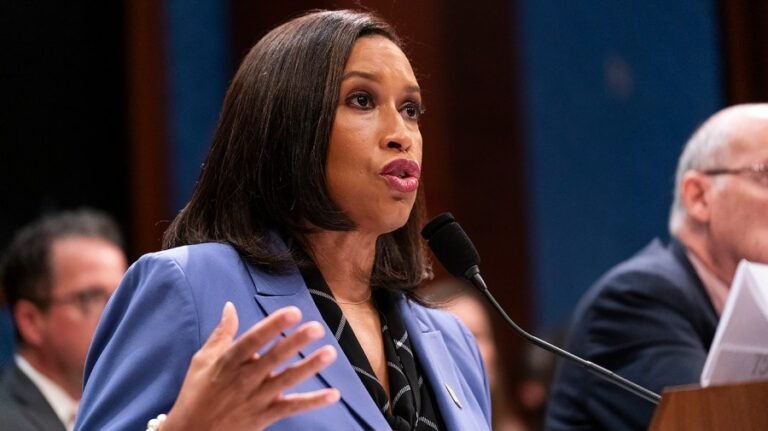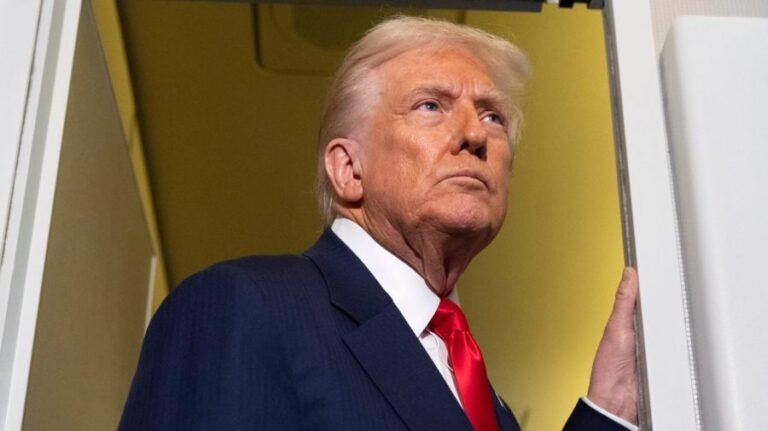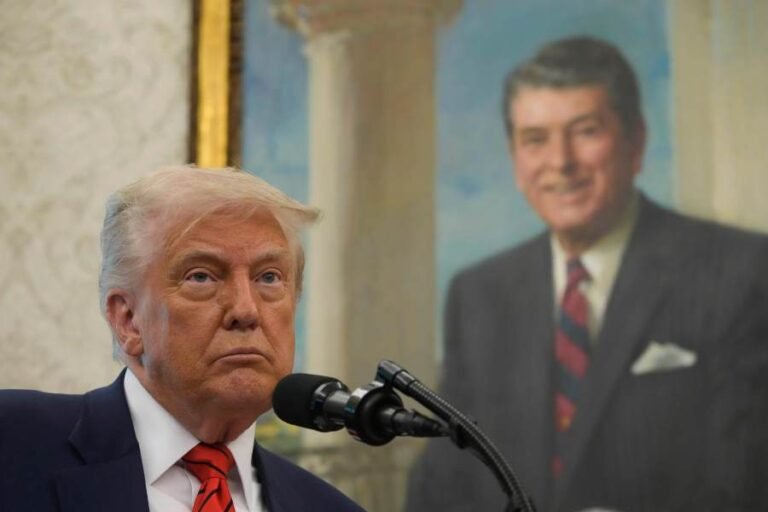
President Trump’s decision to restart nuclear weapons testing as a warning to Moscow is being cheered by his Republican allies in Congress, while Democrats fume over what they describe as a dangerous and misguided retaliation.
It’s an unsurprising public divide and represents another example of how partisan positioning has Congress speaking on opposite sides of national security and foreign policy issues.
While Republicans are praising Trump for pushing back on Russian President Vladimir Putin’s nuclear saber-rattling, Democrats are questioning the utility, safety, financing and precedent of such a step.
“It would be a mistake for us to do this because we have nothing, we have very little to gain,” said Sen. Mark Kelly (D-Ariz.), a member of the Senate Armed Services subcommittee with oversight of America’s nuclear arsenal.
“If we did a test and then China decided, OK, I’m going to start testing. They’ll start testing their nuclear weapons, then their strategic forces capability gets much better,” Kelly told reporters Thursday. “We have zero to gain. This would be a gift to China.”
Sen. Elizabeth Warren (D-Mass.), another member of the subcommittee, questioned why Republicans are not concerned over how much money is required to carry out the president’s directive if their focus is on lowering federal spending.
“The Department of Defense has a long history of understating costs and claiming shorter timelines for these giant nuclear programs. They sell Congress on a rosy picture of how it will all work out,” she said.
“As soon as Congress signs on the dotted line, the costs start going up, and the time to completion stalls, rolling further and further out … Republicans should be just as outraged as Democrats over the DOD’s lack of honesty about how this program is operating.”
But Republicans are standing resolutely with the president, who announced his decision to resume nuclear weapons testing in a Truth Social post Thursday morning in South Korea, shortly before he met with Chinese President Xi Jinping and shortly after Putin boasted of testing new nuclear-powered and nuclear-capable missiles.
“This is not escalatory,” said Sen. James Risch (R-Idaho), chair of the Senate Foreign Relations Committee, calling Putin a “mad man” trying to push Trump’s boundaries.
“Nobody believes he’s [Putin] going to use nuclear weapons … having said that, he’s been doing this all along trying to intimidate Trump. I think Trump was saying, I’m not intimidated about it.”
Speaker Mike Johnson (R-La.) backed up Trump when asked about the president’s directive to the Pentagon to restart testing nuclear weapons, saying it sends a “strong message” to U.S. adversaries.
“The commander in chief wants us to be fully prepared. We are the last great superpower on the Earth. China intends to be a near peer-to-peer advisory to us,” Johnson told reporters Thursday morning. “But in order to maintain peace around the world, you have to show strength, and that’s what the president believes in. That’s what he’s demonstrated over and over.”
Sen. Lindsey Graham (R-S.C.), a defense hawk and a close ally of the president, said Trump’s directive to the Department of Defense (DOD) was a “response” to Putin, whom Trump has been pushing to come to the negotiating table in hopes of ending the Russia-Ukraine war.
“I think Putin’s misjudging Trump,” Graham told The Hill on Thursday. “You threaten our country. You will regret it.”
But some senators acknowledged the president’s directive was short on details.
Sen. Ron Johnson (R-Wis.) said Thursday he will “have to see” what Trump means regarding testing nuclear weapons but emphasized that the U.S. has to keep its “nuclear forces modernized for sure.”
Trump said the U.S. would start testing its nuclear weapons “because of other countries testing programs” and would do so on an “equal basis.”
It’s not clear exactly what Trump wants to achieve. For opponents and arms control experts, the most concerning directive is if the president decides to resume nuclear explosive testing.
Russia has denied it has tested nuclear weapons and criticized the U.S. as confusing its testing of a nuclear-powered and nuclear-capable missile with a nuclear explosive.
Russia claimed that last week it successfully tested a new nuclear-capable cruise missile, known as the Burevestnik, which purportedly flew for 8,700 miles and cannot be stopped by air defenses.
The Kremlin said Wednesday it also tested a new atomic-powered and nuclear-capable underwater drone, known as the Poseidon, with Putin claiming the nuclear reactor that powers it is “100 times smaller” than those on submarines.
“As far as Russia is concerned, it recently tested delivery vehicles, not nuclear explosive devices,” Mikhail Ulyanov, Russia’s ambassador to international organizations in Vienna, including the International Atomic Energy Agency, posted on social platform X.
Sen. Tom Cotton (R-Ark.), a member of the Senate Armed Services subcommittee with oversight of nuclear weapons, argued during Thursday’s confirmation hearing of Vice Adm. Richard Correll — tapped to be the next commander of the U.S. Strategic Command — that the U.S. should maintain and “modernize” its nuclear arsenal.
Separately, the Arkansas senator wrote in a Thursday post on X that Russia and China have conducted “super-critical nuclear weapons tests to advance their nuclear programs.”
“The U.S. has been bound to a zero-yield test standard since 1992,” Cotton said. “It’s welcome news that President Trump is allowing us to conduct activities on par with Russia and China to advance and modernize the U.S. nuclear stockpile.”
But Daryl Kimball, executive director of the Arms Control Association, pushed back on Cotton’s claims that Russia and China have carried out any sort of nuclear weapons testing as “unsubstantiated and highly-debatable.”
“Trump’s nuclear policy is incoherent and unclear: calling for denuclearization talks one day; threatening nuclear tests the next,” he said in a statement.
“But what is clear: U.S. resumption of nuclear testing or reckless words and actions, that trigger a nuclear testing chain reaction, harm U.S. security.”
Farhan Haq, spokesperson for the United Nations secretary-general, responded to reporters’ questions Thursday about Trump’s directive as raising the risks of nuclear conflict when tensions are “already alarmingly high.”
“All actions that could lead to miscalculation or escalation with catastrophic consequences must be avoided,” he said. “From our standpoint, from the secretary-general’s standpoint, nuclear testing can never be permitted under any circumstances.”
Iran used the opportunity to paint Trump and the U.S. as the nuclear aggressor, while the country is under sanctions for failing to comply with nuclear-safety commitments. Iran claims its nuclear program is for peaceful purposes, but the U.S., Israel, allies and experts say Iran is intent on having the capability of building a weapon.
“Having rebranded its ‘Department of Defense’ as the ‘Department of War,’ a nuclear-armed bully is resuming testing of atomic weapons,” Iran’s Foreign Minister Abbas Araghchi wrote on X.
“The same bully has been demonizing Iran’s peaceful nuclear program and threatening further strikes on our safeguarded nuclear facilities, all in blatant violation of international law. Make no mistake: The U.S. is the World’s Most Dangerous Proliferation Risk.”


